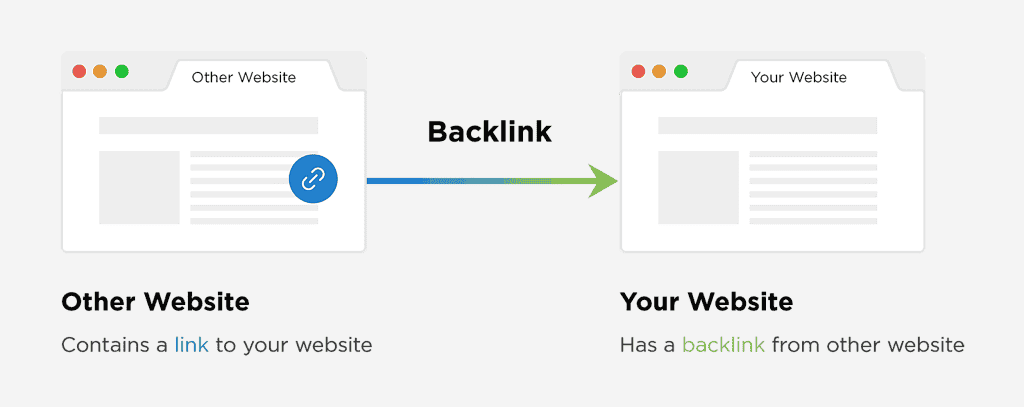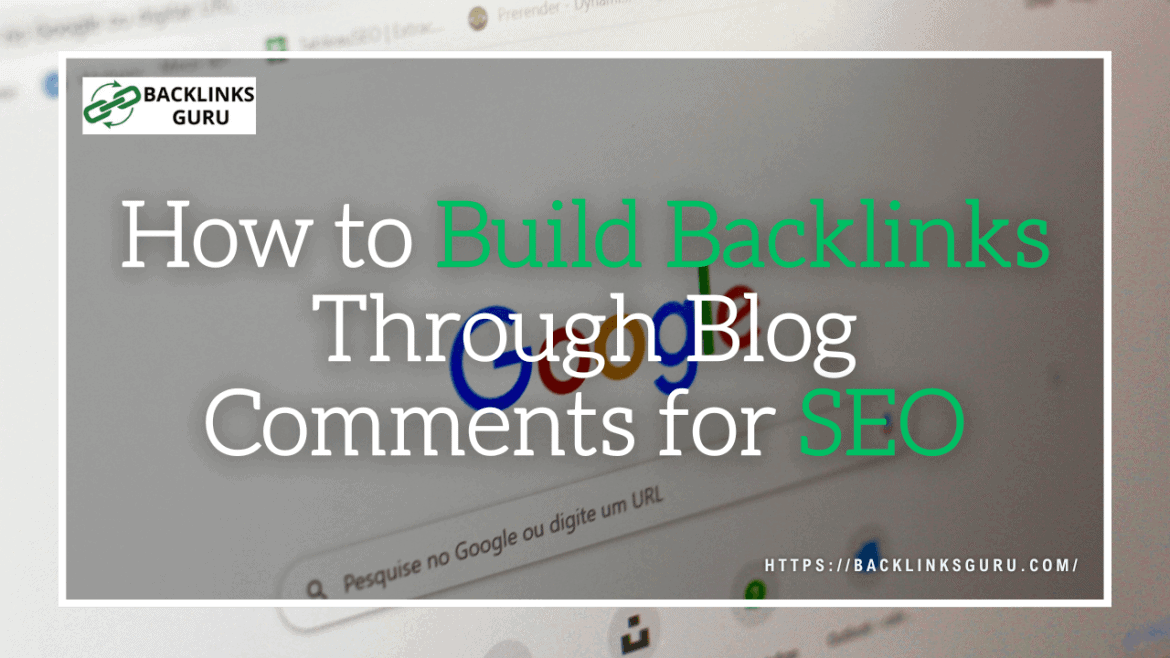💬 Discover How to Build Quality Backlinks Through Blog Commenting and Boost Your SEO the Smart Way 🚀
In the realm of search engine optimization (SEO), the quest for enhancing a website’s ranking is a continuous endeavor. One strategy that has persisted, though sometimes debated, is the utilization of blog comments to build backlinks. This article delves into the practice of building backlinks through blog comments, exploring its significance, effectiveness, and how to navigate it successfully in today’s SEO landscape.
Understanding Backlinks and Their Importance
What are Backlinks?
Backlinks are essentially votes of confidence from one website to another. When a website links to your website, it’s telling search engines, like Google, that your site offers valuable and trustworthy content. These links, often referred to as inbound links, play a crucial role in how search engines perceive the authority and relevance of your website, especially when considering a niche relevant to your own domain.
How Backlinks Affect SEO Ranking
Backlinks are a cornerstone of SEO ranking. Search engines interpret backlinks as a sign that other websites vouch for your content. The more quality backlinks you acquire, the higher your website is likely to rank in search engine results pages (SERPs). This is because a strong backlink profile indicates to search engines that your website is a credible and authoritative source of information. The goal is to get backlinks from high DA blogs.
Quality Backlinks vs. Low-Quality Backlinks
Not all backlinks are created equal. Quality backlinks come from reputable, high DA websites within your niche. These backlinks carry significant weight and can substantially boost your SEO ranking. Conversely, low-quality backlinks originate from spammy or irrelevant websites and can harm your website’s ranking. It is better to get a link from the best blog than many backlinks from blog comments that are spam. Always aim to add value to the blog post.

Blog Commenting as a Strategy for Backlinks
What is Blog Commenting?
Blog commenting is the practice of leaving comments on blog posts, often with the intention of building backlinks to your own website. It’s a form of engagement where you share your thoughts, insights, or questions related to the blog post’s content. The primary goal, from an SEO perspective, is to get backlinks by including a link to your website within the comment, although the effectiveness of this approach has evolved over time, and spammy comments are to be avoided.
How to Get Backlinks from Blog Comments
To effectively build backlinks from blog comments, focus on adding value to the blog post through thoughtful and insightful comments. Find relevant blog commenting sites within your niche. When you leave a comment, make sure it’s relevant to the content and contributes to the discussion. Include your website link judiciously, preferably in the designated URL field, and ensure the blog owner allows dofollow backlinks to boost your SEO ranking. Always avoid comments as spam.
Benefits of Comment Backlinks
1. Referral Traffic Boost
Comment backlinks can drive targeted traffic to a website, especially when placed on niche-relevant blogs with active audiences. When users find a comment valuable or insightful, they may click through to learn more, leading to genuine engagement and potential conversions.
2. Increased Online Visibility
By commenting on a variety of reputable blogs, websites can expand their digital footprint. This increased exposure helps in building brand recognition and authority within a specific niche or industry.
3. Relationship Building and Networking
Thoughtful comments often spark interactions with blog owners and readers. Over time, this can lead to deeper relationships, potential collaborations, and even opportunities for guest posting or content partnerships.
4. Anchor Text Diversification
Comment backlinks allow for safe, natural variations in anchor text. This diversification can help balance a site’s backlink profile and avoid over-optimization penalties from search engines.
5. Supporting SEO with Nofollow Links
Even when labeled as “nofollow,” comment backlinks still hold SEO value. They signal trust and activity to search engines and contribute to a more balanced, organic link profile.
6. Fast and Easy to Implement
Compared to other backlink strategies, comment backlinks are relatively quick to create. When used correctly—avoiding spam and focusing on value—they can complement broader link-building campaigns effectively.

Finding the Best Blog Commenting Sites
Criteria for Choosing Blog Commenting Sites
Relevance to Your Niche
Choose blogs that are topically relevant to your website. For example, if your site is about fitness, commenting on health, wellness, or exercise-related blogs ensures that the backlink contextually supports your content. Relevant backlinks are more likely to drive targeted traffic and align better with Google’s quality guidelines.
Domain Authority and Trust
Prioritize blogs with good domain authority (DA) and trust flow. Sites with higher authority pass more SEO value through backlinks. While DA isn’t the only metric, it helps gauge the potential strength and credibility of the blog you’re engaging with.
Active Engagement and Fresh Content
Select blogs that are actively maintained and have regular posts with engagement from readers. Comments sections with genuine interactions—rather than spam—are a positive sign. Avoid sites where comments are dominated by low-quality or irrelevant links.
DoFollow or NoFollow Balance
While many blog comments provide nofollow links, mixing them with occasional dofollow opportunities creates a more natural backlink profile. Don’t ignore nofollow links—they still have value for traffic, visibility, and a healthy backlink mix.
Moderated Comments Section
Blogs with moderated comments are usually more trustworthy and less prone to spam. This increases the likelihood your comment will be approved if it adds value, and helps protect your brand’s reputation.
Low Spam Score
Use tools like Moz or SpamZilla to check a site’s spam score before commenting. Avoid blogs flagged for excessive outbound links or link manipulation, as backlinks from spammy sites could harm your SEO instead of helping it.
Indexed by Google
Ensure the blog is indexed and its posts appear in Google search results. If a site isn’t indexed, backlinks placed there won’t be crawled or counted by search engines, rendering them useless for SEO.
Visibility of Comments
Only post on blogs where the comment section is public and visible on the same page as the article. Hidden or nested comment platforms may not offer crawlable links.
Top Blog Commenting Sites List
Creating a list of top blog commenting sites requires diligent research. Identify reputable blogs within your niche that have active comment sections. Use SEO backlinking tools to assess their DA and backlink profile. Explore industry blogs and forums recommended by SEO specialists, like Neil Patel. Look for blog owners who are open to engagement. Aim for a diverse list of blog commenting sites for SEO that align with your content and target audience to boost your SEO ranking.
Niche-Specific Blog Commenting Sites
Focusing on niche-specific blog commenting sites enhances the effectiveness of your link building efforts. These sites attract audiences genuinely interested in your domain, increasing the likelihood of valuable referral traffic. Furthermore, search engines consider backlinks from niche-relevant sites as more authoritative, positively impacting your SEO ranking. To get backlinks from the best blog, aim to contribute insightful comments rather than adding comments as spam, so the blog owner can see you add value to the blog, making your backlink profile even better.
Effective Ways to Comment and Build Backlinks
Crafting Quality Comments
Focus on providing insightful and relevant feedback that adds value to the blog post. Crafting quality comments is paramount to successful link building through blog commenting. Focus on providing insightful and relevant feedback that adds value to the blog post. Avoid generic comments or those that are overly promotional, which can be perceived as spam. Make sure to thoroughly read the blog post before commenting, ensuring your comment demonstrates a clear understanding of the content and offers a unique perspective. The better your comments, the easier it will be to get backlinks.
Engaging with Blog Posts
Engaging with blog posts effectively involves more than just leaving a comment; it requires active participation in the discussion. Pose thoughtful questions that encourage further dialogue, share relevant experiences or anecdotes, and offer constructive criticism where appropriate. By demonstrating genuine interest and contributing to the conversation, you establish credibility and increase the likelihood of blog owners and other readers engaging with your comment and clicking on your backlink. You can also add value to the blog post.
Maintaining Relevance in Comments
Ensure your comments are directly related to the topic of the blog post. Maintaining relevance in comments is crucial for maximizing the SEO benefit of backlinks and blog commenting. Ensure your comments are directly related to the topic of the blog post and avoid straying off-topic. Use relevant keywords naturally within your comment to enhance its search engine visibility. The niche in which your website operates should align with the blog commenting sites you choose. Irrelevant comments are often perceived as spam, undermining your credibility and potentially harming your SEO ranking. This will lead blog owners to disregard your submission.
Is Blog Commenting Still Effective for SEO?
Current Trends in Blog Commenting
Current trends emphasize genuine engagement and valuable contributions. The current trends in blog commenting reflect a shift toward genuine engagement and away from spammy link building tactics. Search engine algorithms, including Google’s, have become more sophisticated at detecting and penalizing websites that engage in manipulative link building practices. As a result, SEO specialists are increasingly emphasizing the importance of building relationships with blog owners and providing valuable contributions to the blog post and the community, focusing on blog commenting still as a way to build your backlink profile.
Debunking Myths about Blog Commenting
Several myths surround blog commenting as an SEO strategy. One common myth is that all comment links are inherently valuable for SEO ranking. However, the quality and relevance of the blog commenting sites, as well as the comment itself, play a significant role in determining its impact. Another myth is that blog commenting is a quick and easy way to get backlinks without effort. In reality, effective blog commenting requires time, effort, and a genuine desire to contribute to the discussion. Quality backlinks, especially dofollow backlinks, are worth the effort.
Measuring the Impact of Comment Backlinks
Track referral traffic and monitor SEO ranking to measure impact. Measuring the impact of comment backlinks requires a strategic approach. Track referral traffic from blog commenting sites to assess their effectiveness in driving targeted visitors to your website. Monitor your SEO ranking for relevant keywords to determine whether comment backlinks are contributing to improvements in search engine visibility. Use SEO tools to analyze your backlink profile, identifying which comment backlinks are providing the most value and which may be negatively impacting your website’s SEO. Determine if blog commenting still works for you.

Frequently Asked Questions
How do backlinks from blog comments affect SEO?
Backlinks from blog comments can positively affect SEO by providing valuable links back to your site. When you comment on a relevant blog post, you can gain exposure and potentially increase your site’s authority, especially if the blog has a high domain authority. These links can contribute to your off-page SEO efforts, helping your site rank better in search engine results.
What are the best blog commenting sites for SEO?
The best blog commenting sites for SEO are those that have high traffic and domain authority. A list of free blog commenting sites typically includes authority sites that allow do-follow links. Engaging on these platforms can help you gain quality backlinks while also allowing you to connect with other readers and site owners in your niche.
Do comment backlinks still work for SEO growth?
Yes, comment backlinks still work for SEO growth if done correctly. When you leave a comment that adds value to the conversation, it can lead to more visibility and engagement, effectively driving traffic to your site. This tactic, combined with other backlinking strategies, can enhance your overall SEO performance.
How can I get backlinks from blog comments?
To get backlinks from blog comments, focus on commenting on blogs that are relevant to your niche. Ensure that your comments are thoughtful and add value to the discussion. Many sites allow readers to leave do-follow links, which can help you link back to your site and improve your backlink profile.
What should I include in a blog comment for it to be effective?
An effective blog comment should be insightful, relevant, and engaging. It should add value to the conversation, encouraging readers and site owners to check out your profile and possibly click on your link. Avoid spammy comments; instead, focus on building relationships and providing meaningful insights.
Are backlinks from blog comments considered quality backlinks?
Backlinks from blog comments can be considered quality backlinks if they come from high-authority sites and are relevant to your content. However, it’s essential to ensure that these comments are not perceived as spam. Authentic engagement on niche blogs can yield valuable links that contribute positively to your SEO strategy.
What are some strategies for successful blog commenting?
Successful blog commenting strategies include targeting high-traffic, niche blogs, making genuine comments that spark conversation, and ensuring you are providing insights that are relevant to the topic. Establishing a relationship with blog owners can also enhance your chances of getting backlinks that help your SEO.
Can blog comments help your SEO in the long term?
Blog comments can help your SEO in the long term if they lead to ongoing engagement and traffic to your site. By consistently contributing to relevant discussions and building a network with site owners, you can create a sustainable source of backlinks and authority, improving your site’s ranking over time.



